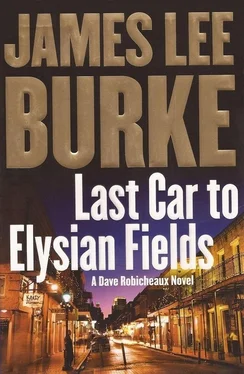“Excuse me, madam, but you need to sit down and stay out of this,” Helen said.
“And you need to work on your sexual-identity problems before you lecture other people in their homes,” Theo said.
Helen gazed through the trees at the bayou and the deserted shacks that had once housed prison inmates, her breasts hard-looking as softballs against her shirt. She reread the warrant to herself, seemingly indifferent to Theo’s insult. Then she lifted her eyes into Theo’s.
“Repeat what you just said.”
“You have no business here,” Theo said.
“Where do you think the burial site is?” Helen said to me, ignoring Theo.
“On a line between here and what would have been the front gate of the prison camp. I’d put it pretty close to that pond inside the fenced area,” I said.
LeJeune raised his hands. “Listen to me,” he said. “I don’t know anything about this man Junior Crudup or whatever his name is. My wife befriended the convicts who worked out their sentences on our farm. She was a kind, gentle, decent person. How in God’s name can you accuse us of hiding the remains of a murdered man on our property?”
Helen walked out into the yard. “Take out that fence and start in a circle. Drain the pond if you have to,” she said to the two heavy-equipment operators.
Helen went back to her cruiser and I began walking down the slope toward the old work camp. Inside the evening shade of the trees I could hear the conversation and tinkle of glasses resume among LeJeune’s guests on the patio.
“Dave, stop,” Theo said, catching my arm.
She’d just had her hair cut and it was thick and even and shiny on the whiteness of her shoulders. The bourbon and smell of ice and mint on her breath touched my face like the tracings of a kiss.
“Your father commissioned a murder,” I said.
“You have it all backwards,” she said.
“Then why are you afraid to go down to the pond?”
“For reasons you don’t understand.”
“You can tell the jury that at your father’s trial.”
“Why do you hate him so much?”
“Because he’s a sonofabitch.”
“I’ll remember you said that to the day I die.”
“Go back home, Theo. Your guests are waiting.”
“I can’t believe I slept with you. I want to peel my skin off.”
Perhaps her response was justified, but at that moment I didn’t care one way or another. Down below, the bulldozer and front-end loader were tearing apart a white-rail fence and a sloping green pasture, looking for the bones of a man who had been beaten to death so a cancer-ridden prison guard could keep his pension and a cuckolded husband his pride.
The heavy-equipment operators worked, by gasoline-powered light until midnight, blading away the grass and topsoil, pushing it into water-beaded, black-green mounds. They came back at sunrise and started in again, scooping huge amounts of wet clay and feeder roots from the oak trees onto LeJeune’s lawn, trenching a drainage into his fish pond, smashing his dock into kindling. By noon the entire landscape between the trees in his backyard and the cluster of cabins by the bayou was an ecological disaster, water oozing from the substrata, perch and catfish fighting for survival in small pools, a cow’s ribs arching out of the clay like a woman’s comb.
A half dozen uniformed deputies in rubber boots raked and probed for hours but found no sign of a human burial. By Wednesday afternoon the excavation area had become a giant, water-filled pit. Since the previous day I had slept three hours. My eyes stung, my jaws were like sandpaper, and a stale, clammy odor rose from my clothes. The heavy-equipment operators shut down their machines and waited. Helen shook her head and the operators climbed down and began packing up.
“We’re in the Dumpster, bwana,” Helen said.
“That body was here. He moved it,” I said.
“Ride back with me. You look like a car wreck,” she said.
“He’s not going to get away with it. I’m going to fry that bastard.”
“You probably will. Even if you have to take everybody down with you. You might give that some thought,” she said.
I opened and closed my mouth and felt my ears popping, the horizon tilting slightly, a buzzing sound inside my head, as though my old companion the malarial mosquito was having its way with me again.
Helen cupped her hand around my upper arm and kneaded the muscles in it. “Come on, Loot, give a girl a lift,” she said.
“What? What did you say?” I said.
She looked at me strangely, her eyes filled with a mixture of pity and sadness.
Not far away, just outside the little town of Jeanerette, Clete Purcel drove down a back road past three antebellum homes that were so stunning in appearance, the tree-shaded lots they sat on so perfect in arboreal and floral arrangement, they looked like Hollywood movie fabrications rather than homes that people of enormous wealth actually lived in. He turned at the green, embanked property corner of the last house in the row, crossed a steel bridge over the Teche, and passed, within fifty yards of the last antebellum home, a rural slum composed of rusted trailers, desiccated sheds, and junker cars that could have been replicated from a photograph taken in Bangladesh.
He removed a pair of binoculars from his glove box and went inside a cafe from which his line of sight allowed him to see the trailer slum that spilled haphazardly to the edge of the bayou. It had not been a good day for Clete. Early that morning he had picked up a bail skip for Wee Willie Bimstine in Opelousas and was about to transport him back to New Orleans, when the skip began jerking against the D-ring anchored on the floor of the Caddy, his face twisted with visceral pain, threatening to soil himself and the convertible if he wasn’t allowed to use the bathroom. Clete cuffed him to a pipe next to the toilet in a filling station and waited outside. In less than two minutes the skip managed to put seventy-five cents in a sexual-enhancement dispenser, smear his wrist with a desensitizing lubricant, slip the cuff, and escape out a window.
Score one for the meltdowns, Clete thought.
A half hour later a woman did a hit-and-run on his convertible in a church parking lot; the investigating traffic officer gave him a citation for an expired inspection sticker; and while Clete argued the situation a flock of robins lit in a tree above his car, the top of which was down, and defecated all over the seats and upholstery.
He drank coffee and focused his binoculars on a trailer that was broken in the center and had vinyl garbage bags taped across the windows It was the home of the skip’s one-time fall partner, an Angola parolee who had been down twice for sexual battery against children. There was no movement inside the trailer, but next door a woman in faded jeans, tennis shoes without socks, and peroxided hair that was waved on only one side walked down to the school-bus stop and waited for her child.
Then she escorted the child, a boy of about eight, back home and closed the door behind her.
A moment later she reemerged with a tall, equestrian-looking man who had a hard, flat stomach and a purple birthmark that seeped from his hairline to the corner of his eye. They kissed on the mouth and the man put on a yellow hard hat and got into a waiting car driven by another man wearing an identical hard hat. The two men parked in front of the cafe and came in and sat down in the booth next to Clete’s.
“Kid come home a little soon?” the driver of the car, a truncated, moon-faced man, said.
The man with the birthmark didn’t reply but instead snapped his fingers repeatedly for the waitress’s attention. After she took the order and went away, he said, “This guy Robicheaux is a walking hemorrhoid. You should see the old man’s property. It looks like a bombing zone.”
Читать дальше












